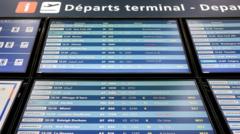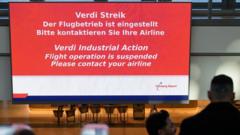Passengers face disruptions as Airline and union clash over unresolved labor issues, leading to mass flight cancellations.
**Air Canada Flight Grounding Amidst Labor Strike: A Growing Concern for Travelers**

**Air Canada Flight Grounding Amidst Labor Strike: A Growing Concern for Travelers**
As Air Canada halts its operations due to a flight attendants' strike, the government intervenes to mediate between both parties.
Air Canada has suspended all operations following a strike by flight attendants that began at midnight on Saturday, leading to significant travel disruptions for passengers. The strike, initiated by the Canadian Union of Public Employees (CUPE), represents 10,000 attendants who are locked in a contract dispute with the airline. A 72-hour strike notice was issued after negotiations reached a stalemate, primarily over issues related to wages and unpaid work.
In light of the situation, Air Canada projected that around 500 flights would be canceled, affecting approximately 100,000 passengers. Following the strike's initiation, the airline swiftly began delaying and canceling numerous flights across its Air Canada and Air Canada Rouge services. However, Air Canada Express flights, which cater to around 20% of the daily customer traffic, would remain operational.
To limit the impact on travelers and the economy, Canadian governmental officials mandated that both Air Canada and CUPE enter binding arbitration to resolve their differences. The labor dispute comes after protracted contract negotiations that lasted more than eight months, with the airline offering a 38% increase in total compensation over four years, though CUPE argued that the proposal fell short of inflation and market standards.
Government intervention commenced with a directive from Jobs Minister Patty Hajdu, who triggered binding arbitration to secure an amicable resolution. Despite the government's move, CUPE claimed that this action violates their charter rights and detracts from their ability to negotiate freely.
The long-term ramifications of this strike are still uncertain. Historical context demonstrates that a similar strike by Air Canada pilots in 1998 led to significant operational and financial losses for the airline, which could indicate the potential scale of repercussions this time.
As flight disruptions continue, Air Canada has advised passengers to refrain from traveling to airports unless booked on alternate airlines. Customers receiving flight cancellations are promised refunds and can cancel return tickets without fees. Meanwhile, the airline has arranged partnerships with other carriers to provide alternative travel solutions.
As the labor dispute evolves, both the airline and union remain pressured to return to negotiations in hopes of restoring normal operations for the tens of thousands of affected travelers.
In light of the situation, Air Canada projected that around 500 flights would be canceled, affecting approximately 100,000 passengers. Following the strike's initiation, the airline swiftly began delaying and canceling numerous flights across its Air Canada and Air Canada Rouge services. However, Air Canada Express flights, which cater to around 20% of the daily customer traffic, would remain operational.
To limit the impact on travelers and the economy, Canadian governmental officials mandated that both Air Canada and CUPE enter binding arbitration to resolve their differences. The labor dispute comes after protracted contract negotiations that lasted more than eight months, with the airline offering a 38% increase in total compensation over four years, though CUPE argued that the proposal fell short of inflation and market standards.
Government intervention commenced with a directive from Jobs Minister Patty Hajdu, who triggered binding arbitration to secure an amicable resolution. Despite the government's move, CUPE claimed that this action violates their charter rights and detracts from their ability to negotiate freely.
The long-term ramifications of this strike are still uncertain. Historical context demonstrates that a similar strike by Air Canada pilots in 1998 led to significant operational and financial losses for the airline, which could indicate the potential scale of repercussions this time.
As flight disruptions continue, Air Canada has advised passengers to refrain from traveling to airports unless booked on alternate airlines. Customers receiving flight cancellations are promised refunds and can cancel return tickets without fees. Meanwhile, the airline has arranged partnerships with other carriers to provide alternative travel solutions.
As the labor dispute evolves, both the airline and union remain pressured to return to negotiations in hopes of restoring normal operations for the tens of thousands of affected travelers.






















